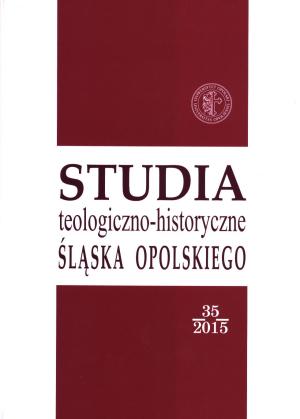Mönchstum und Ökumene nach Andreas Szeptyckyj
Monastic life and ecumenism by Andrew Sheptytsky
Author(s): Augustyn BabiakSubject(s): Christian Theology and Religion, History of Church(es), Theology and Religion, Eastern Orthodoxy
Published by: Uniwersytet Opolski
Keywords: ecumenism; monastic life; Andrew Sheptytsky; Greek-Catholic Orthodox Church; order of Studiets;
Summary/Abstract: This paper concerns the metropolitan Andrew Sheptytsky and his activity for the renewal of monastic life in the Greek-Catholic Orthodox Church at the beginning of the twentieth century. He contributed not only to the revival of religious life, but gave it a new form. The religious foundation for Sheptytsky was eastern spirituality, because it was the monastery of Basilians which aided this formation, and it was completed through study with Jesuits in Kraków. Even through he fulfilled the function of a metropolitan of Lviv-Hal he was still in his spiritual nature a monk.A vision for the renewal of monastic life accompanied Sheptytsky from the beginning of his pastoral service and was developed under the influence of numerous contacts with western orders, like Benedictines, Jesuits and Carmelites. He established an order, gained from their experiences, which responds to Slavic spirituality and religiosity. He began to fulfill this order in 1904, when from two prayer communities he established the foundations of the future order of Studiets. This community took as the foundation of their life the advice of monks written by Studios in the fifth century, and corrected and developed by St. Theodor Studit. In 1923 Sheptytsky obtained from the Vatican confirmation of the rule of their community, which was based on the Byzantine tradition, had numerous elements of the teaching of the western Fathers of the Church, and corresponded with the exigencies of the reality of the time. The basis of the formation of Studiets is not only prayer, asceticism and work, but theological education, patristic knowledge and acquaintance of the eastern liturgy and tradition too. For Sheptytsky the eastern monasticism had to be first of all the source of spiritual life for the Greek-Catholic Orthodox Church and had to influence on the morally and educatory renewal of the believers and the clergy of the diocese.The present article demonstrates the exceptional framework of this order, which was openness to other cultures and religions, through encounters with the Greek-Catholic Orthodox Church of the time. A lot of contacts and activities had an ecumenical dimension. It happened through contact with other Christian’s confessions, showing the richness of the spiritual life, the splendor of eastern liturgy, and indicates the value of unspoiled faith as a way to true unity amongst Christians. The metropolitan Andrew Sheptytsky was an example of this openness, because he personally kept many contacts with different ecclesial communities and was the advocate of the realization of the universal Church. He was not fearful of the benefits from the spiritual richness of the whole of Christianity, through it – attached to the thought of John Paul II – he breathed with both the lungs of the Western and Eastern Church.
Journal: Studia Teologiczno-Historyczne Śląska Opolskiego
- Issue Year: 35/2015
- Issue No: _
- Page Range: 357-370
- Page Count: 14
- Language: German

